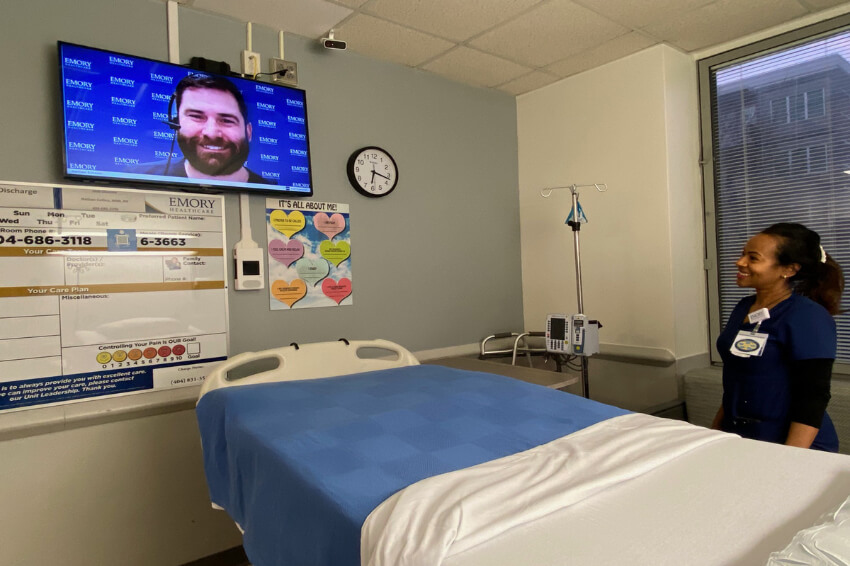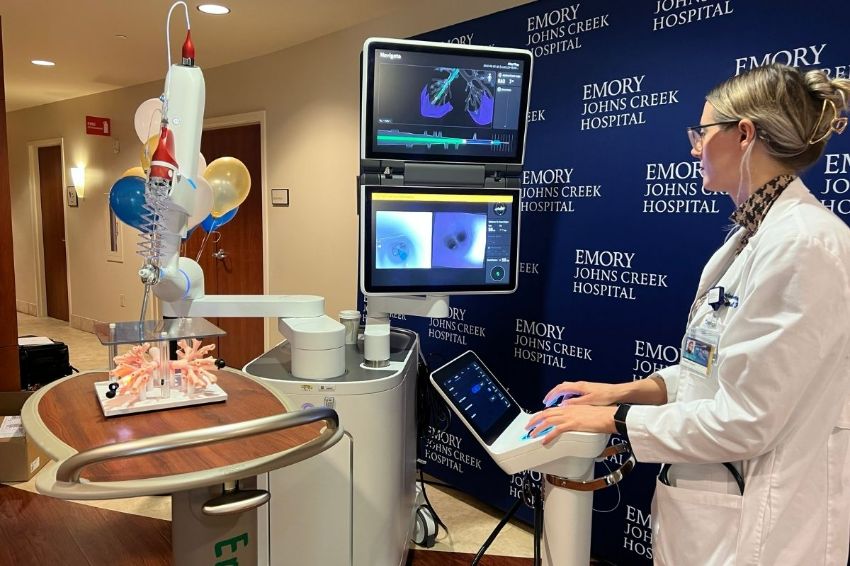Emory University Hospital Midtown is the first Emory Healthcare hospital to deploy and test both new telehealth equipment and artificial intelligence (AI)-driven technology to assist nurses in caring for patients and preventing falls. Using a combination of new hardware, software, telehealth and AI, Emory is collaborating with Illinois-based VirtuSense Technologies to assist nurses with daily tasks and monitoring, so they can focus more on active patient care.
Known as “virtual nursing,” this strategic launch features new technology for remote nursing care, allowing nurses to monitor, assess and support patients from a distance without being physically present. Tasks such as admissions paperwork, medication management, patient education before discharge, and discharge itself are some of the hands-off care activities provided by virtual technology through telehealth. A team of Emory Healthcare nurses, based in a control room located at Emory Saint Joseph’s Hospital, provides the virtual nursing care.
“In a fast-paced hospital environment, the VirtuSense solution will help to enhance patient care through spatial intelligence, including monitoring patients in their hospital rooms to prevent falls and notifying nurses of any concerns, while the virtual nurses provide education and reduce documentation burden,” says Jason Atkins, MBI, RN-BC, vice president and chief clinical informatics officer for Emory Healthcare. “By leveraging virtual nursing in a hospital setting, we believe it will be a game changer in enhancing patient safety and the patient experience, while boosting job satisfaction for nurses.”
Emory University Hospital Midtown is the first Emory hospital to rollmout the new initiative on an inpatient medical/surgical floor. Thirty-two rooms on that floor have been outfitted with new telehealth equipment and AI technology.
Using new LIDAR (LIght Detection And Ranging) technology in patient rooms, patients are monitored for movements that could lead to falls, alerting the care team up to 30 seconds before a fall occurs. At the same time, an automated voice tells the patient to remain in their bed until the care team arrives. Ultimately, the software and AI technology will assist the virtual nurses in carefully monitoring patient data looking for early detection of patient deterioration or emergencies, providing the ability to alert bedside care teams when warranted.
“We want to empower our nursing teams with ambient and augmentative technology to help them best care for our hospitalized patients,” says Alistair Erskine, MD, enterprise chief information and digital officer at Emory Healthcare and Emory University. “This AI-augmented platform extends beyond better nursing workflow and supportive AI, as the technology can also be leveraged for other virtual care needs like clinical consults, medical interpretation and family visits.”
Emory Hillandale Hospital is also rolling out the virtual nursing technology using telehealth on an inpatient floor, and the LIDAR technology will soon follow. In all, the VirtuSense solution will be installed in eight inpatient units (1,000 beds) throughout multiple Emory Healthcare hospitals this year with an expansion likely in 2026, pending the results of the initial deployments.




